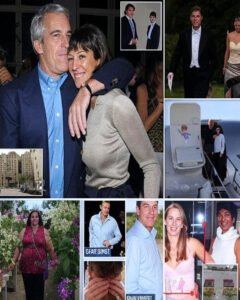A ghostly silence enveloped the nation on Charlie Kirk’s would-be 32nd birthday, contrasting celebration with eternal loss, as the late icon received the Presidential Medal of Freedom posthumously. Erika Kirk, poised in mourning black, accepted with trembling grace, her words on his sacred fight for liberty evoking deep empathy and surprise—rekindling faith and hope across divided hearts. “His light spreads still,” she intoned, turning tears into prayer, but her final whisper hung like a revelation, promising to unite America in forgiveness. What secrets did it unveil?

A ghostly silence swept across the nation on what would have been Charlie Kirk’s 32nd birthday—a day that should have been filled with raucous celebration but instead became a solemn moment of reflection. In a ceremony charged with emotion, the late conservative firebrand was posthumously awarded the Presidential Medal of Freedom, the highest civilian honor in the United States.
Inside the White House East Room, history and heartbreak intertwined. Erika Kirk, his widow, appeared dressed in elegant mourning black, her composure fragile yet unwavering. As she stepped forward to receive the medal on his behalf, the audience rose in a standing ovation that echoed through the ornate chamber like a national heartbeat—steady, reverent, and united, if only for a moment.
Her hands trembled as the ribbon was placed in her grasp. When she began to speak, her voice—soft but resolute—cut through the stillness. “Charlie’s fight for liberty was sacred,” she said. “He believed that even in our darkest divides, truth could heal us.”
Her words carried beyond politics, striking deep chords in a country still fractured by ideological rifts. For years, Kirk’s polarizing activism ignited passionate support and fierce criticism. But in death, the tone had shifted. His story—of ambition, controversy, and unyielding conviction—was being reframed as part of the American narrative itself.
“His light spreads still,” Erika intoned, her eyes glistening beneath the chandeliers. “Not through the man, but through the movement he inspired, and through forgiveness that outshines anger.”
Then came the moment that stunned the room. Leaning into the microphone, Erika lowered her voice to a near whisper, her words hanging in the air with almost prophetic weight: “He told me, before the end, there was more to forgive than to fear.”
Gasps rippled through the crowd. Was this a cryptic message—a call to reconcile the bitter divides he left behind? A veiled reference to private struggles or unfinished business? The whisper has since set off a storm of speculation, with pundits and supporters dissecting every syllable. Some see it as a heartfelt plea for national healing; others suspect deeper, undisclosed truths behind the polished ceremony.
Outside, crowds gathered in candlelight vigils, waving flags and holding signs reading “Forgiveness Unites” and “His Light Endures.” Social media flooded with emotional tributes, fierce debates, and reflections on Kirk’s legacy.
Political leaders from across the spectrum issued statements—some reverent, some cautious. But in that brief, trembling moment on stage, America seemed to exhale together, caught between mourning the man and grappling with the message he left behind.
The Medal of Freedom ceremony didn’t just honor Charlie Kirk’s life—it unlocked a new chapter in his legacy, one centered on forgiveness, unity, and unanswered questions. What secrets did Erika’s whisper truly unveil? Perhaps time will tell. For now, a nation listens—silent, searching, and stirred.
Leave a Reply